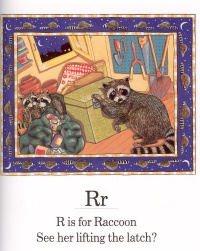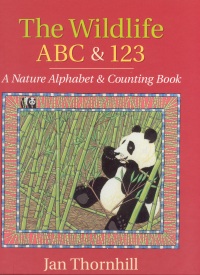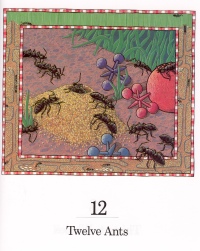| ________________
CM . . .
. Volume XI Number 9 . . . .January 7, 2005
Although both these titles will be familiar as separate editions that were published in 1988 and 1989, respectively, it is worth revisiting these award-winning books as a collection. Think of this duo as Thornhill's tribute to nature. In The Wildlife ABC, Thornhill cleverly combines what should be essential to young readers in a quality alphabet book: bold upper and lower case letters; illustrations consistent with a theme and that reflect the key words, clarity in text and art. Additional "extras" to these requirements, provided by this talented author/illustrator are great word choices which will assist in developing a wider vocabulary, using wonderful expressive verbs like "munching," "sneaking," "inspecting," "paddling" and a delightful rhyming text that has great appeal and is very helpful for young readers learning sequence. 
G is Goose Every picture is encased in Thornhill's trademark of enchanting borders, reflecting the animal, insect or bird used for each letter. Many of the illustrations, as well as the text, incorporate humour. The last picture brings all the animals together and repeats them in the border. Z is for Zoo Children will be encouraged to find all the animals listed and numbered.
This combination book is enjoyable on so many levels. It offers letter and number recognition; it helps to identify many exotic and familiar animals; and it encourages participating in the flowing rhymes. The edition also includes "Nature Notes" at the end that refer to both sections, giving quite detailed background and interesting information on each animal inviting further exploration. The exceptional artwork in this collection far surpasses the standard ABC or counting books. Each framed painting employs rich colours with intricate details and provides a wonderful visual companion to and an interpretation of the text. Highly Recommended. Reesa Cohen is an Instructor of Children's Literature and Information Literacy at the Faculty of Education, University of Manitoba in Winnipeg, MB.
To comment
on this title or this review, send mail to cm@umanitoba.ca.
Copyright © the Manitoba Library Association. Reproduction for personal
use is permitted only if this copyright notice is maintained. Any
other reproduction is prohibited without permission.
NEXT REVIEW |
TABLE OF CONTENTS FOR THIS ISSUE
- January 7, 2005.
AUTHORS |
TITLES |
MEDIA REVIEWS |
PROFILES |
BACK ISSUES |
SEARCH |
CMARCHIVE |
HOME |

